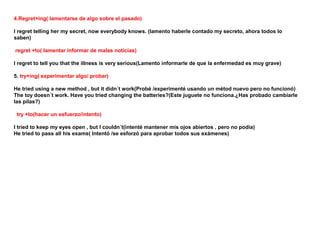Este documento explica las diferencias entre el uso del gerundio (-ing) y el infinitivo (to) en inglés. El gerundio se usa como complemento de ciertos verbos, detrás de formas verbales como can't help, y como sujeto para hablar de acciones. El infinitivo se usa detrás de verbos como want, need y hope, detrás de adjetivos y adverbios, con verbos que llevan complemento directo de persona, y con verbos semimodales. También se explican excepciones como los verbos make, let, forget y
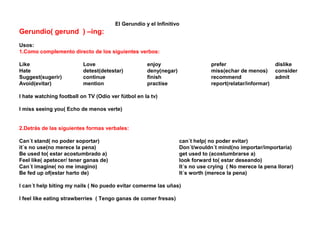
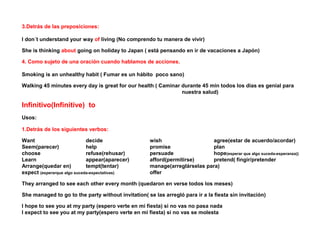
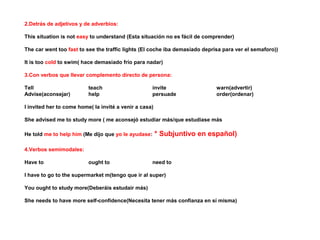
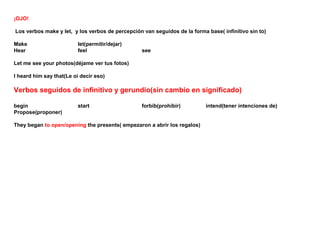
![Verbos seguidos de infinitivo y gerundio(con cambio en significado)
1.Stop+ ing ( dejar de hacer algo)
He stopped eating fast food(dejó de comer comida basura)
stop+ to ( parar para hacer otra cosa)
On the way home, I stopped to buy milk( De camino a casa paré para comprar leche)
He stopped(working) to have a coffee. [paró(de trabajar) para tomarse un café]
2.forget+ing (en frases negativas con el sentido de imposibilidad de olvidar algo que ocurrió en el pasado)
I will never forget visiting the Eiffel Tower( Nunca olvidaré el haber visitado la torre Eiffel
forget +to(olvidarse de hacer algo)
He always forgets to bring his dictionary to lessons(siempre se olvida de traer su diccionario a las clases)
I forgot to phone you ( Se me olvidó llamarte)
3.remember+ing( recordar algo que se hizo en el pasado)
I remember talking to him about the subject(Recuerdo haber hablado del asunto con él)
I remeber seeing them together (recuerdo haberles visto juntos)
remember +to( acordarse de hacer algo)
Remember to lock the door before you leave(acuérdate de echar la llave antes de irte)
I remembered to phone him (Me acordé de llamarlo)](https://image.slidesharecdn.com/ppinfinitiveandgerund-121106123441-phpapp02/85/infinitive-and-gerund-5-320.jpg)
